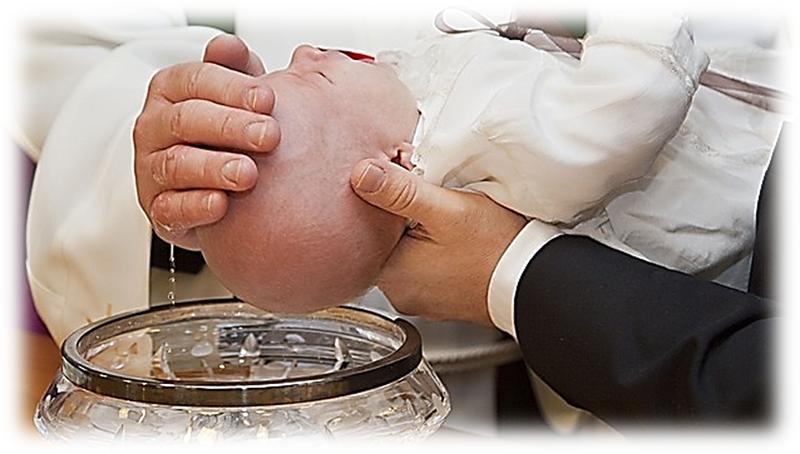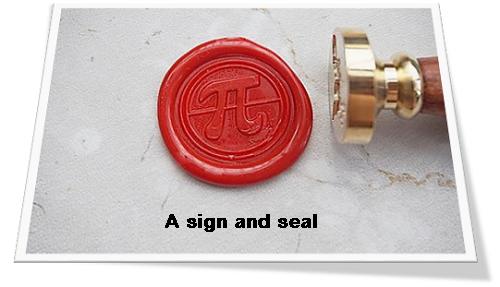Baptism and the Covenant
Baptism and the Covenant

The promises of God are incredibly rich. Instead of wrath and hell there is the promise of grace and life.
Exactly because these promises are so rich does each Christian pause at some time or another to think about the question of whether or not these promises are for himself personally. This counts all the more so when one remembers that the grace of God is not applied to all men; there are both the elect and the reprobate. So the question becomes:'' How do I know whether or not I really am a child of God?" "How can I be certain that I will inherit eternal life?"
The Lord God would not have us doubt whether or not we belong to Him and are heirs of His promises. It is to prevent doubting that the Lord has granted to His Church the sacrament of Holy Baptism. Through this sacrament the Lord God assures those who receive it that they really are children of God, that they really have salvation. In this article, I wish to demonstrate the truth of this thesis.
Baptism and Circumcision⤒🔗
To understand how the Lord God uses baptism for the strengthening of faith, we could look through the New Testament for information. The New Testament would seem a logical choice because baptism was not known as a sacrament in the Old Testament. We shall find, however, that the New Testament, though it says much about baptism, does not give us a full-orbed understanding of the sacrament. The reason for that is – and this, too, I hope to demonstrate presently – that the sacrament of baptism, as instituted by Christ, takes the place of the Old Testament sacrament of circumcision. The content of the sacrament of baptism is essentially the same as the content of circumcision, with this difference that one looks forward to the coming of Christ, while the other looks back to a Christ that has come. So it is to circumcision that we must turn if we wish to understand what baptism is.
Content←⤒🔗
The Old Testament sacrament of circumcision dates from the time of Abraham, Genesis 17. There came a day when God appeared to Abraham with the following message: "I will make my covenant between Me and you," v. 2. That message is repeated in v. 7: "I will establish My covenant between Me and you."
God did not leave ambiguous the content of these words to Abraham. This covenant meant that the Lord would "…be God to you and to your descendants after you," v. 7. God, in other words, tells Abraham that He is Abraham's God, and Abraham is God's child. That is the content of the covenant.
The implications of this content of the covenant can be better understood when we recall that the human race, through the fall into sin in Paradise, allied itself with the evil one. The fall implied that mankind severed his bond with God and joined himself to Satan. Remembering that fact underscores the significance of this covenant which God makes with Abraham. For with this covenant God says nothing other than this: by nature you belong to Satan, yes, but I lay claim on you, Abraham. I declare that you are no longer Satan's property but Mine.

With that, the richness of the covenant comes into sharp relief. Belonging to Satan, as consequence of the fall, had implied that the anger of an offended God rests upon the betrayer, man. And if the anger of holy God rests on someone, who can escape it? Well does Scripture record that reality: "It is a fearful thing to fall into the hands of the living God," Hebrews 10:31. Yet this offended God makes a covenant with Abraham, and in that covenant, God lays claim on Abraham; God issues a declaration: you are Mine, even though you offended Me, even though you are sinful. The implications of such a declaration from God can only be that Abraham no longer belongs to Satan, God is no longer angry with Abraham, Abraham has life. And that in turn means that the content of the covenant implies forgiveness of sins; covenant people are heirs of salvation, heirs of eternal life. Obviously, then, this covenant made Abraham by far the richest man on earth. From being Satan's property, He is claimed by God and made to be God's possession.
Certainty←⤒🔗
God did not wish Abraham to question whether or not God actually meant what He said. Yet God knew His servant Abraham, knew that he was but a weak and sinful human. Reckoning with this weakness in Abraham, God graciously gave to Abraham a sign both to remind him of what He had said and to spell out that He really meant it. Said God: "You shall be circumcised in the flesh of your foreskins, and it shall be a sign of the covenant between Me and you," v. 11.
Reading of this sign that God gives to Abraham, one would be inclined to say that if ever anyone should not have needed a sign, it would have been Abraham. God spoke very personally to him, and after a conversation such as this from God there surely should have been no reason for Abraham to question whether or not he belonged to God. Abraham's own ears had heard God's words. Yet even to Abraham God gave the command to circumcise himself as a sign of that covenant! Though God spoke face to face with Abraham, God wished Abraham to carry in his body, to his dying day, a sign to remind him of what God had said to him on that particular day, a sign to spell out beyond all doubt that God actually did make His covenant with this sinner. Never was Abraham to doubt it; each day anew, he was to be confronted with the assurance that he belonged to God, had life. In His wisdom God did not consider memories, of what He had once said to His covenant child, to be sufficient assurance; in his own body Abraham had to wear the visible proof that this covenant was real. What the Lord in His goodness wanted to prevent was that Abraham should ever doubt concerning whose possession he was, whether he actually did belong to his faithful Saviour Jesus Christ, or still in fact belonged to the evil one. Hence this visible sign underlining the spoken reality.
Children←⤒🔗
Abraham was not the only one to be circumcised. For God made His covenant not only with Abraham – God did not adopt for Himself only one child – God made His covenant also with the children He would give to Abraham, v. 7: "I will establish My covenant between Me and you and your descendants after you." In fact, "throughout their generations" Abraham's children would be children of God.
That meant for the children of Abraham that they, too, should have no doubt as to their identity. They belonged to God and not to Satan, because God had claimed them to be such. So each descendant of Abraham could appeal to Genesis 17:7 and say: "Look, there it says what God once said concerning us: we belong not to the evil one but to God Most High, He is our God."
And so each might have the assurance that he had forgiveness of sins and salvation. Each had that assurance simply because God had once spoken.

But again, God knows the heart of man, that the children of Abraham, insensitive and infirm (Art. 35, Belgic Confession) as they were, were likely as not to question whether God really meant for them what He declared to Abraham in Genesis 17. For that reason God instructed Abraham to make sure that every male child of him was to be circumcised as a sign and seal of the reality of the covenant. They should receive that sign just as did Abraham, and they should receive it for the same reason: to their dying day they should carry in their own bodies, throughout their generations, the mark that they really belonged to God, the assurance that God had truly claimed them. For God did not intend to have to speak to each child of Abraham individually to assure each one that he really belonged to God. God spoke once to Abraham, and that one declaration was comprehensive; it included all the children of Abraham. God claimed ALL as His own; none belonged to Satan anymore.
To be specific, this meant that Isaac – to mention him by way of example – was not allowed to wonder whether or not he actually was a child of God. He was not to doubt whether or not salvation was for him, whether or not God's wrath still lay on him. True, he had not himself received a special revelation, a special communication from God that he actually was an heir to salvation, delivered from the severe wrath of God to which he was subject. There was no voice, no dream, no inner assurance of such redemption for Isaac personally. Yet he was a child of God, and he was an heir to eternal life, simply because that word which God had spoken to Abraham did not count for Abraham alone; it counted for his descendants also: "I will establish My covenant between Me and you and your descendants … to be God to you and to your descendants after you."
That included Isaac. And the reminder of that covenant Isaac carried in his own body wherever he went; he was circumcised. Daily he could see that sign, and so daily he could assure himself that yes, it was really true, God had made His covenant also with him, he was a child of God just as much as father Abraham was, he too had forgiveness of sins and life eternal. Circumcision was the evidence.
Doubt←⤒🔗
But suppose now that Isaac doubted whether or not the promises of redemption really were for him, doubted even though he had in his body the sign of the covenant. If he chose not to believe that sign, he would implicitly be saying that he did not believe God. Although God said that He claimed not only Abraham but also his descendants to be His, saw to it even that each would receive the sign, if then there was still doubt with Isaac, then he would in fact be calling into question God's truthfulness. It would essentially imply that Isaac would refuse to accept God's Word at face value. But that is the same as suggesting that God is a liar! God had said in no uncertain terms that He made His covenant with Abraham and his descendants. So there is no room for wondering here, for doubting, unless one is prepared to say that God is a God who would pull the wool over someone's eyes.
And what counted for Isaac as first generation descendant of Abraham counted also for Esau and Jacob as second generation descendants, as well as for David and Daniel so many generations later. They wore the sign of the covenant in their bodies, a sure sign that God meant exactly what He had said long ago to their grandfather Abraham about his descendants to endless generations. For the reality of Psalm 105 endures: "The steadfast words He did command, a thousand generations stand."
God's covenant is forever, because God is God. Those to whom God sovereignly gives the sign have no grounds for doubt.

Baptism←⤒🔗
The Apostle Paul calls baptism "the circumcision of Christ," Colossians 2:11ff. That would mean that the content of the Old Testament sacrament of circumcision is essentially the same as the content of its New Testament replacement: baptism.
That baptism has, for the New Testament, the same content as circumcision had for the Old becomes clearer from Acts 2. Peter preaches his Pentecost Sermon, concerning the significance of the crucifixion and resurrection of Christ, and the subsequent outpouring of the Holy Spirit. The result of his preaching was that the audience was cut to the heart and they wondered what they should do, v. 37. Peter's reply was that they should repent of their sins, they should believe in the Lord Jesus Christ as the Saviour sent by God. With that command to repent comes also an encouragement to be baptized, v. 38.
We would wonder why this audience should bother to be baptized. Peter mentions the ground for this injunction in v. 39: "For the promise is to you and to your children and to all that are far off."
To come to grips with the question of which promise Peter refers to here we are to note that the apostle describes this promise as having been made "to you and to your children." The promise which God had made to each Israelite and his children was that promise of the covenant, the covenant which God made with Abraham and his seed. Because that covenant has been made with every descendant of Abraham here present, Peter enjoins his whole audience – after repentance – to be baptized. For circumcision pointed forward to the Saviour that was to come. Now that the Saviour has come that sign of circumcision has become defunct. In its place has come baptism, a sign that points backward to the cross. Baptism does not embody a new promise; it contains the same promises that the sacrament of circumcision signified, be it that this promise comes now in a new dispensation. So it is that all with whom God makes His covenant – believers and their seed, Romans 4 – are no longer to be circumcised but baptized. The content of the two sacraments is the same.
Heidelberg Catechism←⤒🔗
The Heidelberg Catechism supports the thesis that baptism as the sign of the covenant is the proof to Christians that the Lord has indeed made us His children; we have salvation. I think of Lord's Day 26:
How does holy baptism signify and seal to you that the one sacrifice of Christ on the cross benefits YOU?

The answer reasons that one may be certain about the benefits of baptism simply because the sign of baptism has been given to a person, and the sign is not hollow because God does not lie. In that sign God gives the promise that the blood and Spirit of Christ wash away sins. Nor is this a promise that one cannot be sure about, it is not a maybe. No, the promise is fixed, because God is God. Sins are washed away, present tense. Wow the recipient of the sacrament has the benefit that comes from the sacrifice of Christ on the cross. Today, that child is God's child. That is also why:
God-fearing parents ought not to doubt the election and salvation of their children whom God calls out of this life in their infancy.Canons of Dort, I, 17.
It may sound great, it may sound too great to believe (and that is basically beside the point!), but this is the content of the promise of the covenant nevertheless.
Rich←⤒🔗
It's all so wonderfully rich. Almost too rich to believe. Yet this is what the Lord says in His Word. And if God says it, we may not doubt it; God does not deceive.
Baptism is God's sign and seal that He saves the recipients from the power of the devil; each belongs to God and not to Satan, each has forgiveness of sins and life eternal, each has a Father who cares for him day by day. Baptism does not symbolize a delightful dream, a pleasant thought. Baptism rather signifies an indescribably rich reality. It is undoubtedly because baptism is so incredibly rich that the evil one does whatever he can to spread distortions about this sacrament. As church people, the readers of this magazine, we are all baptized, older and younger alike. That means that we may apply to ourselves all that is written above. In baptism, each of us receives the assurance, from no one less than God Himself, that God saved us from the power of the devil. In baptism, God Almighty says to each of us individually: you are not Satan's property; you are My possession. And we know that God is no man that He should lie. So there is for us no reason to question whether or not we have salvation. God told us quite clearly.
No Free Ride←⤒🔗
But that does not mean that all who are baptized are now free to act as they please under the pretense that they are saved anyway. Scripture makes amply clear that a covenant has two sides.

The covenant begins by stipulating a reality based on God's decree: not Satan but God is our Father. Once that covenant is established, both a promise and a demand enter the picture. The promise is that God will continue to keep us as His children, with all the benefits and privileges that come with that position. Yet this promise is not a blanket promise, something unconditional. For God added also a demand. God decreed that His promise of continued faithfulness should hinge on the attitude of God's covenant people to His covenant. The demand that the Lord tied into His covenant was none other than that His people should believe that God actually did claim them, did deliver them from the power of the devil. If they would believe that, would believe that the content of their baptism was a fact – they really were God's children – why, then the benefits of being God's children would be showered on them as well; the promise is made reality. On the other hand, if they should refuse to believe the reality spelled out in the sacrament, then the benefits of these promises would not come to them and the covenant would not profit them.
The existence of this covenant gives to covenant people, then, the responsibility to believe the promises inherent in that covenant. There is only one who can prevent a covenant child from receiving the blessings of the covenant, and that is that covenant child himself. Each must choose: do I believe what God said, or do I believe that God deceived me? That is the question that the reality of our baptism places before each one of us. So it is WE who have to work with the reality of the covenant in order to receive the benefits that are promised in it. That is the mandate that is implied in the sacrament of baptism: believe what God did.
Conclusion←⤒🔗
It may be hard for us to believe the riches of that covenant made with believers and their seed. God would not have us doubt. For that reason He gave that sign of baptism to spell out to us that we are His, to reassure us that we have forgiveness of sins and life. The water has dried from off my forehead years ago, but I can dig out of the cupboard that certificate, duly signed and recognized by Ottawa, that, yes, I really am baptized, God really did make His covenant with me.
May I doubt that God is MY God, that I belong to Him and not to Satan, and therefore have salvation? I may not, because GOD DOES NOT LIE.

Add new comment